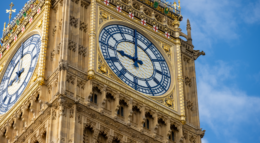
Just how dangerous is Corbyn?
It is the Labour moderates, not Corbyn who the Conservative leadership should fear the most, writes Evgeny Pudovkin.
The last time the hard left took over the Labour party, things didn't go smoothly. The party's 1983 hard left manifesto prompted its MP to describe it as "the longest suicide note in history". Bennites' reputation for political innocuousness – a movement considered equally kind-hearted as it is soft-headed – had since become a conventional wisdom.
This time may be different. Jeremy Corbyn, perhaps the most left-wing politician in Europe, is two points ahead of Theresa May, the Conservative leader, as the public's top choice for the Prime Minister. On the economy, too, Labour has tapped successfully into the electorate's grievances. Britons, the Legatum Institute report demonstrated, are increasingly less averse to the government playing a greater role in the economy.
In the end, it is the anti-incumbency factor that can get Labour over the line. Brexit negotiations are an arduous process. Should the discussions take the wrong turn – or, worse, break down altogether due to either side's fault – the opposition would stand ready to capitalise on it.
There is then the hurdle of implementing Universal Credit. Moreover, as the Social Market Foundation's James Kirkup pointed out, with inflation on the rise, the caps on housing allowance benefit, put in place by previous government, will start to bite. That provides Labour with another stick to beat the Tories.
Corbyn's premiership, in other words, is not something that can be dismissed. Cue the flurry of attempts to discern the contours of its agenda. Neither skeptics nor optimists beat around the bush. The Chancellor Philip Hammond said Labour poses an 'existential challenge' to the British economy. Commentators on the left, in their turn, expect no less from their leader than a full-blown transformation of the status-quo.
But can Corbyn's government really bring about radical change? At first glance, his victory will be historic, installing in Downing Street perhaps the most left-wing politician in British history. Yet a closer look betrays several reasons to doubt the efficacy of the Labour executive.
As things stand, Corbyn's victory at the next election is unlikely to be decisive. If Labour secures a majority at all, it will be wafer-thin. This, in turn, begs the question of Corbyn's ability to push policies through parliament. Labour MPs, it is worth remembering, remain as divided as ever on the whole list of issues, be it the economy, Brexit, or immigration. Even the payroll vote defies the whip with worrying regularity.
Can Corbyn make his MPs toe the line? With 428 rebellions to his name as a backbencher in three Labour governments, he emerges as an unlikely as a poster boy of party loyalty. And while Corbyn was at least courteous with the whips, his closest acolyte, the shadow Chancellor John McDonnell, exhibited less civility. Since then no love has been lost between him and the Blairites. To say this bodes ill for the party's discipline would be an understatement.
If Corbyn's ability to manage his backbenchers raises doubts, then so is the quality of his Cabinet. Clement Attlee's oligopoly comprised Ernest Bevin, Hebert Morrison and Aneurin Bevan. Tony Blair, aside from Gordon Brown, had a prolific team of 'spads' at his side. In comparison, Crobyn's retinue seems lackluster even on a good day.
Another factor that may constrain Labour is the economy. Whether post-war US loans were necessary for the development of the welfare state is moot. But the Marshall Plan certainly helped Attlee in his quest for universal provision of public services.
Blair, for his part, inherited from the Tories an auspicious economy. The budget deficit stood at 1%, the problem of debt overload then non-existent. The annual GDP growth was 3.1%, the inflation rate under 3% and stable, an opposite of 'stagflation'.
Can Britain afford Labour's Caracas economics today? The party's promises include expensive subsidies to middle-class, re-nationalisation programme, universal welfare provision to the elderly, and new health and educational infrastructure. Of all these items only a fraction will actually be devoted to productive means. The Labour's preferred option for funding all those pledges – taxing corporations and 'the rich' – will not be enough. Thus, the Bank of England will react to fiscal expansionism by raising interest rates. This can impede capital investment and, as a result, aggravate the productivity problem.
To some, that was the Corbyn's brigade plan all along: to destroy the free-market economy through, in Marxist vernacular, accentuating the contradictions of capitalism. Asked what he felt during the 2008 crash, McDonnell said he felt vindicated. "This is a classic crisis of the economy, a classic capitalist crisis", he claimed. "I've been waiting for this for a generation".
There are, however, several issues with this "the worse it gets the better" thesis. To begin with, there is a difference between what politicians say and what they do in office. Preaching morals from the backbenches is one thing. Running stuff is quite another. If the government's decisions damage people's living standards, they won't care much for what good cause they are meant to suffer.
McDonnell and Corbyn are thus bound to moderate their act, at least to some extent. And even if they do go rogue, both the media and civil servants will simply sit and watch. The government will face hostile briefs from civil servants. The dissent among the MPs will grow.
Seen in this light, Corbyn's government is hardly the most threatening option for the Tories. The real danger still lies in Labour choosing a more moderate leader. Someone who, while emotionally invested in a leftist cause, is also intellectually alive to political realities.
The moderates have learned tricks from Corbyn's playbook – employing radical rhetoric, promising middle-class subsidies, remaining evasive on Brexit and migration. They can also get stuff done. If one of them succeeds, he or she might lock a Tory out of Downing Street for more than a tenure.














